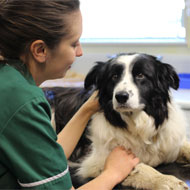Veterinary nurses 'crucial' in emergency triage

"Failure comes from an inability to act in a crucial moment".
In a veterinary nursing lecture at BSAVA Congress, Canadian-born Andrew Linklater emphasised the importance of 'hospital readiness' in preparing to receive emergency patients.
Optimising hospital readiness can be achieved through thorough preparation and organisation and, in doing so, often eliminating the need for 'fancy diagnostics' on first point of contact. Remaining calm through good preparation is key.
He said: "Our job is to bring calmness to the situation so we can react in a rational way". By employing strategies and tactics including daily inventories, stock checks and designated triage areas or zones, the triage process can be smooth and successful.
Andrew Linklater continued by citing role definitions and assigning jobs according to levels and specifications of skills and training as integral to optimum outcomes when triaging patients.
Again, emphasising the importance of remaining calm, Linklater explained how communication in practice is also vital in preparing to treat urgent cases. Awareness of impending arrivals across all staff is key in ensuring that roles can be implemented. Staff should know and be confident in their skillset and be ready to hand over responsibility to reduce anxiety levels in the emergency situation.
When referring specifically to intubation, Andrew Linklater said: "We need to take control so the animal is no longer anxious and suffering. We want to stop that cycle and take over the airway. If you’re getting anxious you can bet the animal is as well."
In a five-point triage plan, Linklater outlined the importance of identifying and prioritising life threatening problems and stated that "failure comes from an inability to act in a crucial moment".



 The RCVS has announced a new version of its 1CPD mobile app, with enhanced features for veterinary surgeons and veterinary nurses to record their continuing professional development.
The RCVS has announced a new version of its 1CPD mobile app, with enhanced features for veterinary surgeons and veterinary nurses to record their continuing professional development.